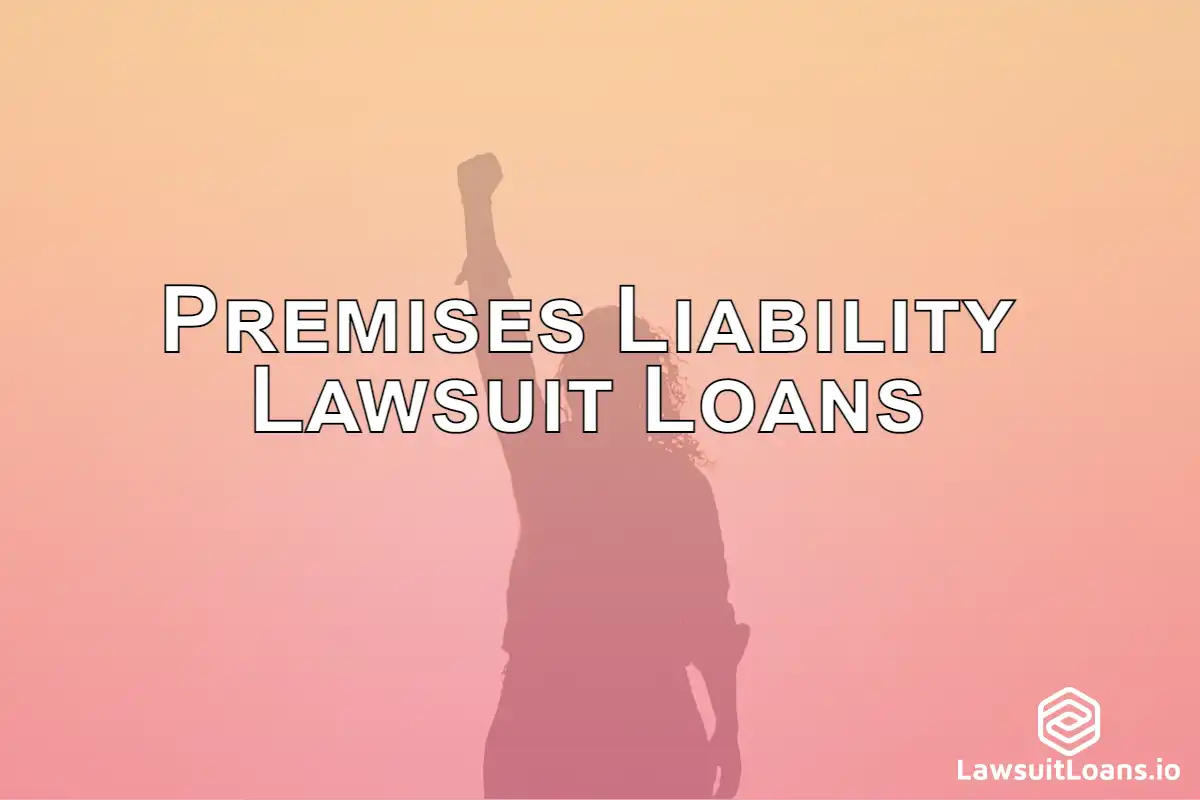Premises Liability Lawsuit Loans
- Get Cash as Soon as the Same Business Day
- Rates as Low as 2.5% Simple, Monthly
- Repay $0 if You Lose Your Case
Apply in Seconds




Premises Liability Lawsuit Funding
When an unsafe or defective condition on someone else’s property causes you to be injured, you may have the right to sue the owner or tenant of the property for damages. The legal principle of holding those having control over property or premises responsible for maintaining them to prevent accidents and injuries is known as premises liability.
Slipping and falling on the ice-covered entryway of an office building is an example of a premises liability case that could cause serious head, neck and back injuries. You hire a personal injury lawyer who files a lawsuit against the owner and maintenance company of the building for damages, but premises liability cases take time before there is a settlement and even longer when a liability insurance company for the defendants drags its feet to delay having to pay the claim.
A premises liability lawsuit loan gives you immediate access to a portion of the expected settlement or verdict without imposing any risk or pressure on you to make monthly payments. In other words, you get a cash advance to use for household bills, medical expenses or any reason that you desire.
Apply NowHow Lawsuit Loans Work
Here’s how the lawsuit loan process works in three easy steps. The entire process can be completed within 24 hours with your attorney’s help.
Apply Online or Call Toll-Free
Apply online or call us toll-free at (866) 594-1343. Submitting your application takes minutes.
We Review Your Case
Next, we contact your law firm and collect basic information to review your case. Review only takes a few hours.
You Receive Funds
You and your attorney review and sign our funding contract. Once complete, you can have funds within hours.
Qualifying for pre-settlement funding
If your attorney filed a lawsuit to recover compensation for you because of injuries that you sustained in an accident on someone else’s property, you can apply for pre-settlement funding. Pre-settlement funding, which is also referred to as lawsuit loans or lawsuit funding, lets you borrow a portion of the value of a future settlement or judgment to use for any purpose that you wish.
How much funding can I qualify for?
The strength of your claim for damages and the value of a future settlement or verdict are the two main factors affecting the amount you may borrow with a premises liability lawsuit loan. Funding companies decide the terms of the lawsuit loans they offer, including how much of the value of a claim they will authorize as a cash advance. Generally, companies limit funding to 10% to 15% of the claim’s value. For settled premises liability claims, LawsuitLoans.io can offer up to 50% of the value of the claim.
What information is required?
When you apply for pre-settlement funding with LawsuitLoans.io, all that is asked of you to get things started is your name and contact information, the type of case that you have pending, and the name and contact information of your attorney. Everything else that is needed to review your claim, determine its strength, estimate its settlement value, and determine if it qualifies for funding will be obtained from the premises liability attorney who represents you.
Get an Instant Quote
Input your requested funding amount and the time your case may take to settle here to see your potential savings and costs when you choose LawsuitLoans.io. While we sometimes offer rates as low as 2.5%, our calculator assumes a simple, non-compounding monthly rate of 3.3%. This calculator is for illustrative purposes only. Actual terms may differ. Please contact us for an instant, written quote for your request.
Advance Amount:
Months Until Settlement:
$2,900
Total Cost
Pay $2,900 on a lawsuit loan of $10,000 if your case settles within 6 months of your advance.
$1,697
Your Savings
Save $1,428 compared to competitors on a lawsuit loan of $10,000 if your case settles within 6 months of your advance.
33%
Percent Savings
Save 33% on a lawsuit loan of $10,000 if your case settles within 6 months of your advance.
How lawsuit loans work
If you have a case pending in a state or federal court where the relief demanded from the defendants is a monetary judgment, as in personal injury and employment law cases, your case may qualify for a lawsuit loan. Underwriting criteria for lawsuit funding focuses entirely on the lawsuit and whether it will result in a settlement or verdict awarding money from which the cash advance and interest earned on it can be repaid to the funding company.
Companies offering lawsuit loans do not ask you for credit or employment information because what you get is a non-recourse loan, which means that you have no legal obligation for repayment in the event that you lose the case. The only source of repayment is a judgment or settlement in the lawsuit.
Get up to $500,000 With Rates as Low as 2.5% Simple, Monthly
Premises liability lawsuit information
A premises liability lawsuit is a type of personal injury claim based on the negligence of property owners, landlords, and anyone occupying or in control of real property, which would include tenants. Winning a premises liability lawsuit requires evidence proving that the party in control was negligent in maintaining the property or did something that put people using the property at risk of being injured.
Common types of premises liability claims include:
- Dog bites
- Slip-and-fall accidents
- Swimming pool accidents
- Assaults and other criminal activities
A building owner who fails to repair broken outdoor lighting, particularly in parking lots and parking garages, could be held liable for a person falling or becoming the victim of a crime because of the lack of lighting.
What is a premises liability claim?
The principle behind premises liability claims is that the owner or person in control of real property should be held responsible for failing to maintain and take care of it to keep lawful users of the property from suffering injuries. The law places the burden on owners, landlords and, to a limited degree, tenants to ensure the safety of guests, visitors and others using the property.
A tenant may avoid being held responsible for an accident caused by a broken sidewalk if there is a lease making the landlord responsible for repairs. However, a tenant could be responsible for injuries suffered by someone delivering a package who is attacked by the tenant’s dog.
Premises liability and personal injury
Personal injury law holds a person responsible for payment of damages when their negligence causes someone to suffer injuries. Premises liability is a type of personal injury claim. Others include:
- Car accidents
- Pedestrian accidents
- Truck and commercial vehicle accidents
- Medical malpractice
- Assault and other forms of intentional conduct that inflict injuries on others
Proving a premises liability claim requires evidence that the person you seek to hold responsible knew or should have known about the dangerous or hazardous condition existing at the premises and failed to take appropriate steps to repair it or warn others of the hazard.
Proving negligence in a premises liability lawsuit
In order to prove negligence and hold an owner or person in control of premises liable for injuries suffered by a person lawfully on or using the property requires evidence of the following:
- A duty of care was owed by the owner to the injured person. Someone unlawfully trespassing on property may not be owed the same duty of care under law of the state where the accident occurs as a person lawfully on the property.
- A breach of the duty of care by failing to maintain the property by removing or correcting hazardous conditions they knew or had reasonable opportunity to know existed.
- The breach of the duty of care caused the injuries suffered by the plaintiff.
Premises liability cases are difficult to prove and require extensive investigation to identify and gather evidence to prove liability.
Common premises liability accidents
Common premises liability accidents include the following:
- Slip-and-fall accidents: Broken sidewalks, potholes, torn carpeting, broken floor tiles, broken steps, snow and ice, and wet floors. Toys, power cords, tools and other items left on the floor or ground where people walk.
- Dog attacks: Dogs allowed to roam without a leash or confinement to a fenced yard or other enclosure may attack and bite.
- Lack of maintenance: Poorly lit stairwells, lack of lighting in parking garages and parking lots and other issues caused by a failure to maintain the property may cause accidents.
- Lack of appropriate security measures: A criminal act that injures someone using the premises would be the fault of the person committing the act, but building locks that do not work properly, leaving dark secluded areas of the premises without adequate lighting and a lack of other measures that could deter harm caused by criminals may be the fault of the owner.
If you were injured on property belonging to another person, consult with a personal injury lawyer to learn what rights you have to collect damages from the property owner.
Get Started
Apply today and get funds in as little as 24 hours!